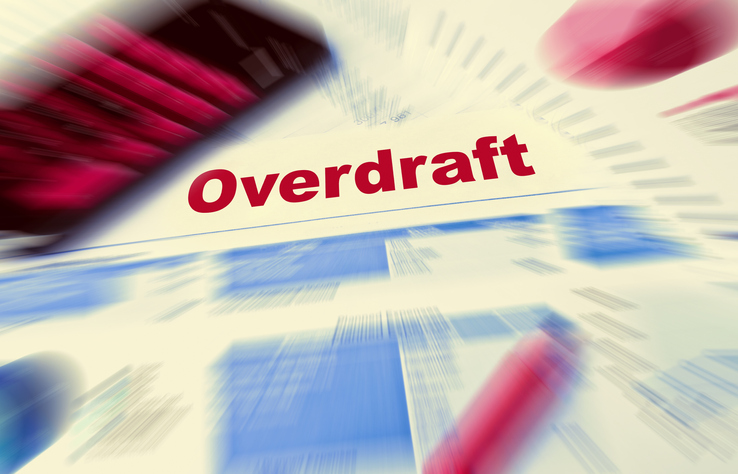Both overdraft and NSF (insufficient funds) fees can hurt the cash flow in your bank account. Without enough cash in your account you might get denied at a grocery store checkout or incur late fees on missed payments to creditors. Overdraft and NSF fees are often grouped together, but they aren’t the same. Here is how you can get charged for each and what the differences are.
Consider working with a financial advisor for advice on building budgets and developing a financial strategy.
What Are Overdraft Fees?
Overdraft fees can occur when you try to transfer money out of your bank account and there isn’t enough money to cover the transaction. When an overdraft occurs, the bank covers the remainder of the transaction and may or may not charge an overdraft fee.
Overdrafts can happen either manually, like when you use your debit card, or automatically, like with a monthly bill payment. Overdraft fees do vary by bank, but according to the Consumer Financial Protection Bureau, the cost may be approximately $35.
How Overdraft Fees Work
Each bank has its own overdraft policies. For example, some charge significant fees each time your account is overdrawn, while others waive these fees entirely. Typically, banks will protect customers against overdraft fees, up to a certain amount – but only if they have opted into overdraft protection.
Even if you opt into overdraft protection, it doesn’t mean you won’t be charged for overdrafts. It simply means the bank will let transactions go through when you don’t have enough funds to cover a transaction. Whether the bank charges a fee for this service is for them to decide.
What Are NSF Fees?

Non-sufficient funds or NSF fees also occur when you don’t have enough money in your account to cover a transaction. However, with an NSF fee, the transaction won’t complete. This is what usually results in a situation where a check “bounces.” The average NSF fee is $32 in the U.S., according to the CFPB.
How NSF Fees Work
NSF fees can occur if your bank offers overdraft protection, but you haven’t opted in. The bank won’t cover the rest of the transaction when this happens, resulting in an NSF fee. There are other situations where you might be charged an NSF fee, such as if you overdraw your account and you’ve already exceeded the bank’s overdraft protection limit.
Comparison of Overdraft Fees and NSF Fees
Overdraft fees and NSF fees are similar in many ways. The most notable difference between the two is whether the transaction goes through (overdraft) or not (NSF). The table below shows key distinctive features of each.
How Overdraft Fees and NSF Fees Compare
| Overdraft Fee | NSF Fee | |
| Average Fee | $35 | $32 |
| Transaction goes through | Yes | No |
| Charged until account has sufficient funds | Yes | No |
| Can be avoided with overdraft protection | Yes | No |
When Should You Opt In or Out of Overdraft Protection
Opting into overdraft protection can make sense if you want your transactions to go through even when your account balance is low. It can help avoid declined purchases at stores, missed bill payments, or bounced checks. If you know you can quickly add money to your account to cover the overdraft, paying a small fee may seem worth the convenience.
However, overdraft protection can also lead to expensive fees if you frequently spend more than you have. Every time you overdraw, you could get hit with a fee, making a small purchase much more costly. If you are someone who often forgets to check your balance or struggles to manage spending, opting out may save you a lot of money. Reviewing some money management tips could also help you budget more effectively.
Opting out of overdraft protection means that if you don’t have enough money, your transaction will simply be declined. You won’t be charged an overdraft fee, but you might face an NSF fee depending on your bank’s policies. Opting out is a good choice if you want tighter control over your spending and prefer not to risk extra charges.
The right choice depends on your habits. If you like the flexibility and rarely overdraw your account, opting in could work. If you want to avoid any chance of fees and stay strict with your budget, opting out may be better. Many banks let you change your choice later if your needs change.
How to Avoid Overdraft Fees and NSF Fees
NSF fees and especially overdraft fees can add up quickly. However, there are a few steps you can take to avoid them:
- Check your balance regularly. You are more likely to overdraw your bank account if you don’t know how much you have. Check your balance regularly, such as weekly or each time you get paid.
- Activate low balance alerts. You can set up a low balance alert and have your bank send you a text or email if your balance goes below a certain threshold.
- Set up direct deposit. If you haven’t done so already, set up direct deposit with your employer. This will help you keep money flowing into your account.
- Stick to a budget. Budgeting software and apps let you set limits on how much you’re able to spend. That will help you prevent overspending so you will (hopefully) always have the cash on hand you need.
- Have an emergency fund. Having an emergency fund can be helpful in many ways. It lets you keep more cash on hand, so you won’t fully deplete your cash reserves when the unexpected happens.
Bottom Line

Both overdraft fees and NSF fees occur when you try to spend more money than you have. The biggest difference is that the transaction still goes through with an overdraft. With an NSF fee, the transaction is canceled. While banks often charge fees when this happens, some waive these fees in some situations and others have abandoned them completely. Still, regularly monitoring your finances, including your checking account balance, is good practice. You can also set up alerts to let you know when your balance falls below a certain threshold.
Tips on Bank Accounts
- A financial advisor can help you work through your banking needs and put together a plan that works for your unique situation. Finding a financial advisor doesn’t have to be hard. SmartAsset’s free tool matches you with vetted financial advisors who serve your area, and you can have a free introductory call with your advisor matches to decide which one you feel is right for you. If you’re ready to find an advisor who can help you achieve your financial goals, get started now.
- If you plan to open a bank account, be sure to check SmartAsset’s checking & savings guide. Some checking accounts are better than others; for example, some have monthly fees and minimum account balances. Be sure to research the best options before opening a new checking account.
Photo credit: ©iStock.com/SIphotography,©iStock.com/Edwin Tan ©iStock.com/doockie
